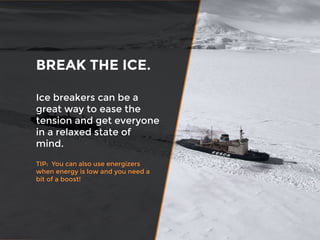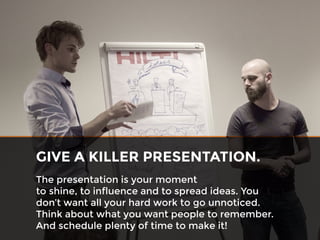5 Lessons From Creative Facilitation
- 2. Creative sessions can be a gold mine
- 3. Creative sessions can be a gold mine ..or a time-wasting disaster.
- 4. These lessons will increase both the quality of your results, as well as your productivity.
- 6. Never go into a creative session without a clear idea of what you want out of it. The desired output will guide your session. IDENTIFY GOALS.
- 7. It is crucial that you carefully plan your session in detail. You want to know exactly how each part of your session follows the other. PLAN YOUR SESSION.
- 8. That means making a detailed schedule and a logical order. TIP: Look at your results after each activity. Walk through each step and see if the structure makes sense.
- 9. PREPARE THE GROUP. Try to get the group familiar with the problem and its context. This will avoid wasting time in the session and give you a headstart!
- 10. If you’re working with a buddy, explain what you expect. Think beforehand what you’ll need help with. Inform him or her of your weaknesses. INFORM YOUR BUDDY.
- 11. DEFINE LESSON 3
- 12. Always look critically at the ‘problem as given’ and try to define the ‘problem as perceived’. Often the roots of the problem lie much deeper. ANALYZE THE PROBLEM.
- 13. “A problem well understood, is a problem half solved.” - Charles Kettering
- 14. IDEATE LESSON 3
- 15. Ice breakers can be a great way to ease the tension and get everyone in a relaxed state of mind. TIP: You can also use energizers when energy is low and you need a bit of a boost! BREAK THE ICE.
- 16. MORE IS BETTER. At the beginning of the process you want quantity over quality. Don’t over-think ideas. Take everything and move along. This is known as ‘suspension of disbelief’. TIP: Try to aim for 10 ideas a minute!
- 17. “Nothing will stop you from being creative so effectively, as the fear of making a mistake.” - John Cleese
- 18. 3 STAGES OF IDEA GENERATION. Make sure you always follow your idea generation sessions through. The silly ideas are necessary to get to the new and useful insights!
- 19. USE THE ROOM. Your mood is largely influenced by the room you are in. Just going from one area to another will help clear your mind and prevent you from getting stuck. TIP: Go outside! Take a walk! It might seem like wasting time, but it is does wonders for your creativity.
- 20. You can also use the room, to connect it to your problem.
- 21. PLAYFUL ATMOSPHERE. Creating a playful vibe will help remove boundaries. Having toys or stress-balls lying around can be a great way to do that.
- 22. IDEATE INDIVIDUALLY. Allow people to generate ideas individually for a fixed amount of time. This allows you to gather everyone’s opinions.
- 23. GUIDE LESSON 4
- 24. It’s up to you to make sure everything goes according to schedule. Take the lead when necessary. TIP: If you feel lost during a session ask your buddy to help you. BE IN CHARGE.
- 25. Your focus should be on facilitating and guiding, not controlling and participating. Learn to let things go. AVOID CONTROLLING.
- 26. PRESENT LESSON 5
- 27. The presentation is your moment to shine, to influence and to spread ideas. You don’t want all your hard work to go unnoticed. Think about what you want people to remember. And schedule plenty of time to make it! GIVE A KILLER PRESENTATION.
- 28. We are wired to listen to stories. Use that to your advantage. Take the audience on a journey. WRAP IT IN A STORY.
- 30. The single most important thing to remember is that there is no one good way. Make it your own. Use what’s distinctive about you. Play to your strengths and facilitatie in a way that’s authentic! DO IT YOUR OWN WAY.
- 31. Let’s recap:
- 32. PREPARE DEFINE PRESENTGUIDEIDEATE LESSON 1 LESSON 2 LESSON 5LESSON 4 LESSONS LESSON 3 5
- 33. THANKS FOR WATCHING! SPECIAL THANKS: MARC TASSOUL , LILI SUKIRMAN, JAN BUIJS CREATIVE FACILITATION 2014 Luke Veerman lukeveerman@gmail.com @lukeveerman lukeveerman.com
































